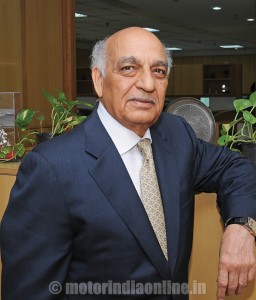The Automotive Component Manufacturers Association of India (ACMA) has welcomed the thrust given to promote exports in the new Foreign Trade Policy 2015-20. It has expressed satisfaction over the focus given to consolidation of various export schemes and further simplification of procedures to help integrate India in the global value chain, improving ease of doing business index through online and e-governance interventions and reducing the transaction cost in international trade.

Congratulating the Minister of State, Ministry of Commerce & Industry, Mrs. Nirmala Sitharaman, the ACMA President, Mr. Ramesh Suri, said: “We are glad that the new Foreign Trade Policy 2015-20 is pragmatic and progressive. It gives a clear direction to the nation’s export agenda. It also provides the much-needed framework to enhance export of goods and services as well as generate employment, which is in line with the ‘Make in India’ vision of Prime Minister Narendra Modi.”
He added: “172 tariff-lines of auto components are benefitted under the new policy compared to the earlier 166. It is also heartening that the incentives provided encourage local sourcing and manufacturing as they are based on the amount of value addition. Further, the auto component industry continues to be incentivised for exports to the traditional markets as well as the emerging markets”.
Some of the other key provisions of the new policy include:
• A stable policy for five years with mid-term review.
• Export incentives consolidated into two schemes – the Merchandise Exports from India Scheme (MEIS) and the Services Exports from India Scheme (SEIS). Duty credit scrips issued under MEIS and SEIS and the goods imported against these scrips are fully transferable and can be used to pay customs and excise duty as well as service tax.
• Under the export promotion capital goods scheme (EPCG), export obligation is reduced from 90 per cent to 75 per cent in case of capital goods sourced locally. This will promote the domestic capital goods manufacturing industry.
• Indian manufacturers who are status holders will be allowed to self-certify to qualify for preferential treatment under the Preferential Trade Agreement (PTA), Free Trade Agreement (FTA), Comprehensive Economic Co-operation Agreement (CECAs), and the Comprehensive Economic Partnership Agreement (CEPAs). This ‘approved exporter system’ will help exporters in getting fast access to international markets.
• Basic customs duty paid in cash or through debit under duty credit scrips can be taken back as duty drawback.